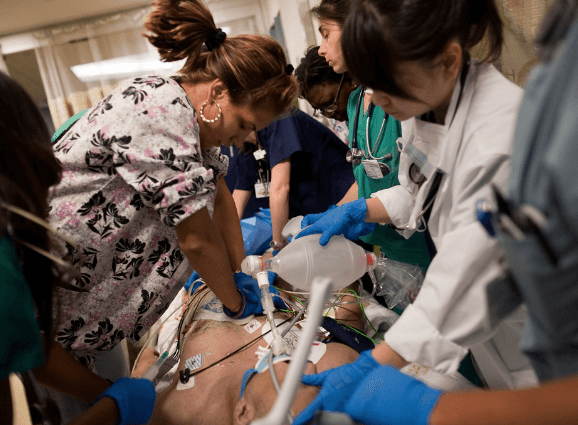
One Moment, One chance – The Life Saving Intervention of Bystander CPR
Someone — maybe a friend or even a family member — has sudden cardiac arrest right in front of you. Their heart has stopped beating. They need help. What can you do?
It was a Monday night, and as an intern working in a busy hospital, I was completely worn out. I vividly remember sitting in a chair in the emergency room when the piercing sound of the siren suddenly alerted us to an incoming case.
As a medical intern, I would always take a moment to pray before seeing a patient, hoping for even the faintest pulse—our ray of hope to guide the next steps in care.
We received a 45-year-old man on a stretcher. As I palpated for his pulse, I discovered there was none. It hit us hard that over an hour had elapsed since his collapse, and we were overcome with a sense of helplessness. A person who experiences a sudden cardiac arrest needs attention immediately; after four minutes of no oxygen, brain damage occurs and for every minutes that goes by, the victim’s chance of survival decreases by 10%.
This particular man was having dinner with his wife and daughter when he suddenly collapsed. His family, in shock and unsure of what to do, hesitated to call for help, not realizing the seriousness of the situation. Instead, they tried to wake him up by sprinkling water on his face and tapping him. It took them about 30 minutes to finally call an ambulance and by the time paramedics arrived and started CPR, it was too late. The delay cost precious time, highlighting the importance of knowing how to respond in an emergency.
Emergencies can occur anywhere—at home, at the workplace, in a park, in a parking lot, or at a busy street café. What would you do if you witnessed someone collapse and then become unresponsive? Would you simply wait for help to arrive, or would you immediately call 911? Now, consider that the emergency medical service (EMS) might not show up right away. What if no one else steps in to help and you're the only one present? Would you take on the responsibility of trying to save their life, even if the outcome might not be successful?
I couldn't help but ask myself, why are so many people unaware of CPR – a life-saving skill? Is it because they do not recognize an emergency when they see one, or fail to understand the urgency of the situation? Is it the fear of taking responsibility for someone else's life, especially when it's a stranger, or the worry of doing something wrong? Maybe it's the fear of legal trouble, or simply the lack of confidence to act in such a critical moment, hope that someone else will step in, or they are scared they will not perform CPR correctly.
As mentioned in the blog article, The Importance of Bystander CPR, any CPR is better than none. Bystander CPR means CPR given by a person that is not a professional, but a layperson and it can make the difference between life and death.
Every second counts when a life is on the line. Taking action, rather than hesitating, can save a life. CPR isn’t just a skill, it’s a responsibility. By learning how to respond to a sudden cardiac arrest, you’re not just preparing for emergencies – you’re giving someone a fighting chance to live. Don’t let fear or doubt keep you from making a difference. Be ready and confident with the skills to save a life.
At Starting Hearts, we can provide you with specific training that can make a life-saving difference.
Contact us for more information: info@startinghearts.org.
Dr. Vinita S Kulkarni is a medical doctor and a health care volunteer based in India.
